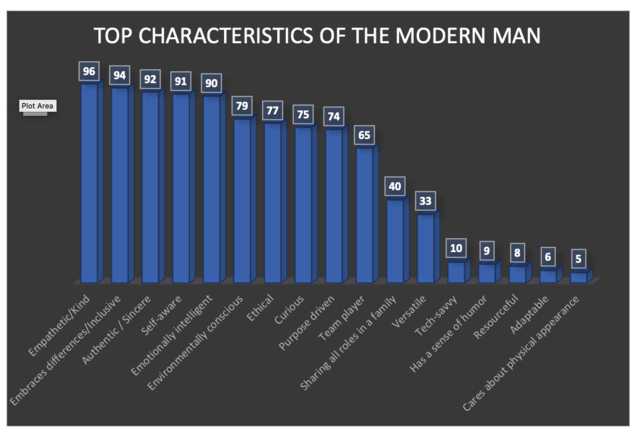Relationships
10 Rules for a Modern Masculinity
The new masculinity playbook will give life more meaning.
Posted July 7, 2021 Reviewed by Hara Estroff Marano
Key points
- Men need a shift from going it alone—the Atlas-like mentality needs to go.
- A shift to a modern masculinity is underway, whether we want it or not. If we open a conversation about it we can influence the direction.
- Solutions to hard questions emerge a level above the one where we're stuck. We are stuck on politics, political correctness, and stereotypes.
- Answers are found when we enter with a beginner's mind and question our programming so that we each find our unique path.
As longstanding cultural structures and stereotypes are being reevaluated, masculinity and manhood are in crisis. The old masculine stereotypes of being aggressive, privileged, and tough, while also being hypersexual and unemotional, are being dismantled. At the same time, we are also seeing these old stereotypes being re-embraced around the world.
In previous blog posts, we have discussed a softer form of the traditional masculinity concept of being the tough protector and sole provider in a family or a relationship. This notion puts extreme pressure on men, isolates them, and often leads to mental health struggles while also affecting relationships at work, at home, and amongst friends. This is what we call “The Atlas Complex of Men,” in which men carry the weight of the world on their shoulders alone and believe it will collapse unless they continue to do so.
With the aim of starting a constructive discussion about modern manhood and modern masculinity, the MANTORSHIFT Institute conducted a qualitative research project in the U.S., the U.K., France, Germany, Austria, Jordan and Iran. There were over 200 men interviewed of various age groups and backgrounds. In two previous posts I have summarized why we conducted this research and what were some of the first findings. In this final blog about this work, we report some of the remaining findings and provide some foundational ideas about what we call the Playbook for Modern Masculinity.
We have found that the five defining characteristics of a modern man are empathetic, inclusive, authentic, self-aware, and emotionally intelligent. The below diagram shows the top 17 characteristics that were named in the interviews.

It is widely agreed that an individual needs to find their own models, and no commonly agreed on or shared models are available. Most respondents can’t name someone who embodies modern masculinity or models the modern man for them.
Some politicians were mentioned as positive and negative examples. There was a very strong tendency, though, for citizens of a country to not highlight a politician from their own country. For example, several non-French respondents mentioned Emmanuel Macron as a good example of modern masculinity, while French respondents disagreed and, in fact, named him as someone who models the opposite. Others mentioned Nelson Mandela and Barack Obama as positive examples. Donald Trump was mentioned by many respondents as the antithesis of a modern man.
One question that inevitably comes up is, if we know what modern masculinity is, why don’t we do it? One important barrier is that men still experience high expectations from society and, increasingly, a negative bias. There are still high expectations for men to provide financially and protect physically; vulnerability is often met with confusion and disapproval from women. These expectations and associated shaming in turn can often fuel a bitter return to the belief of male superiority. In a highly image-conscious world where inner values are not widely recognized and only financial success matters, men find it increasingly difficult to remove their traditional masks and authentically express who they really are.
When asked for their advice to young men about how to avoid a return to traditional masculinity, most respondents focus on curiosity and learning, finding a unique path for manhood. They say it is built through acceptance and in conversation with others while also being resilient and courageous in discovering vulnerability and emotions.
After hearing from men around the world, we believe that a constructive dialogue about what it means to be a modern man should continue. This discussion needs to be not only among men but also between men and women. We don’t believe that shaming or making men feel guilty is useful in a constructive discussion, contrary to the current trend as seen in the controversial #MeToo Gillette ad in 2019.
If we want to gain new practitioners of modern masculinity, it is increasingly clear that instead of focusing the discussion on whether patriarchy existed or still exists, it is more useful to define the specific behaviors desired of men (and women) and the behaviors that no longer serve.
In summary, the 2020/21 MANTORSHIFT research specifically points to the following 10 core behaviors for men who want to find a healthy identity and masculinity. We see these points as the foundation for a new Playbook for Modern Masculinity:
- Listen and expose yourself to opinions that are different from your own in the media and in art.
- Meet and discuss with people who have different political and worldviews.
- Expose yourself to travel and different cultures in as many ways as possible.
- Always check the source of information that you are being served and do as much independent thinking and cross-checking as possible.
- Bring your attention to what you can do in your family, relationships, and the way you conduct business in terms of treating others, and find ways to become an ally to women.
- Strive to find a higher purpose in situations, rather than seek to understand what divides. This is best done by identifying higher level goals that might unite us rather than divide.
- Refrain from divisive political terminology (i.e., terms such as left or right, conservative or liberal) and instead focus on building a healthy community, creating deeper and healthy relationships, sustaining mental health, raising happier children and more such basic needs shared by all.
- Create a conversation with your partner about your goals, common goals, roles, and then revisit the discussion on a regular basis.
- Continue to develop and evolve your own understanding of what masculinity and being a modern man mean for you.
- Seek ways to integrate the two sides (traditionally referred to as yin-yang or masculine and feminine) in yourself so that you can be a more whole human being rather than a follower of your own cultural and societal programming. Don’t go it alone, reach out for professional help to coaches, men’s groups, and therapists.


